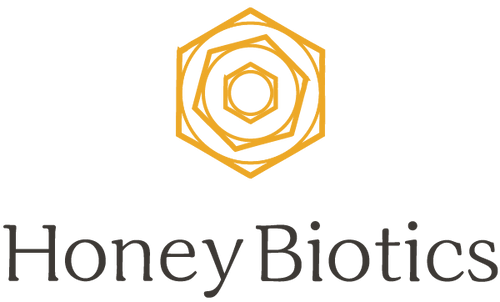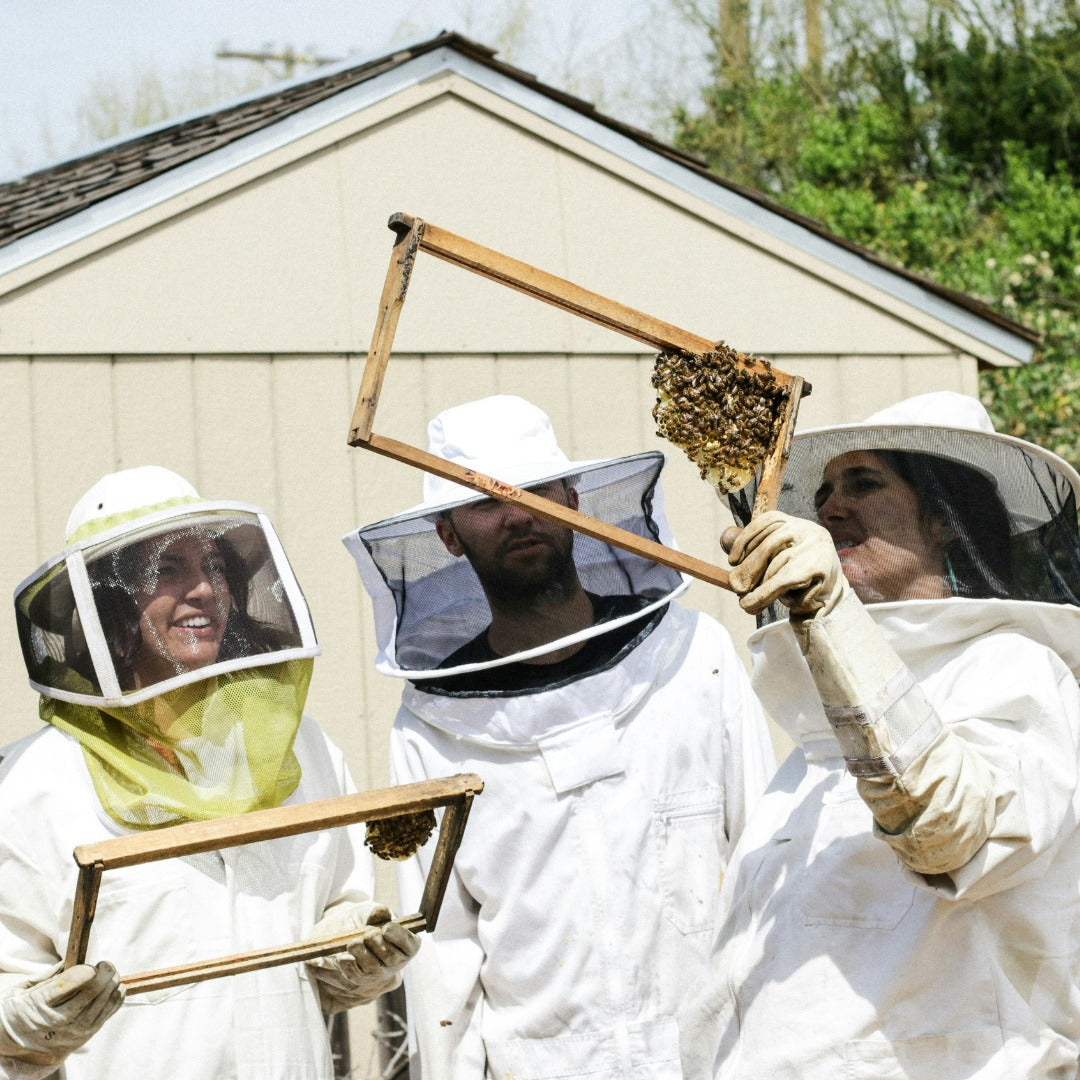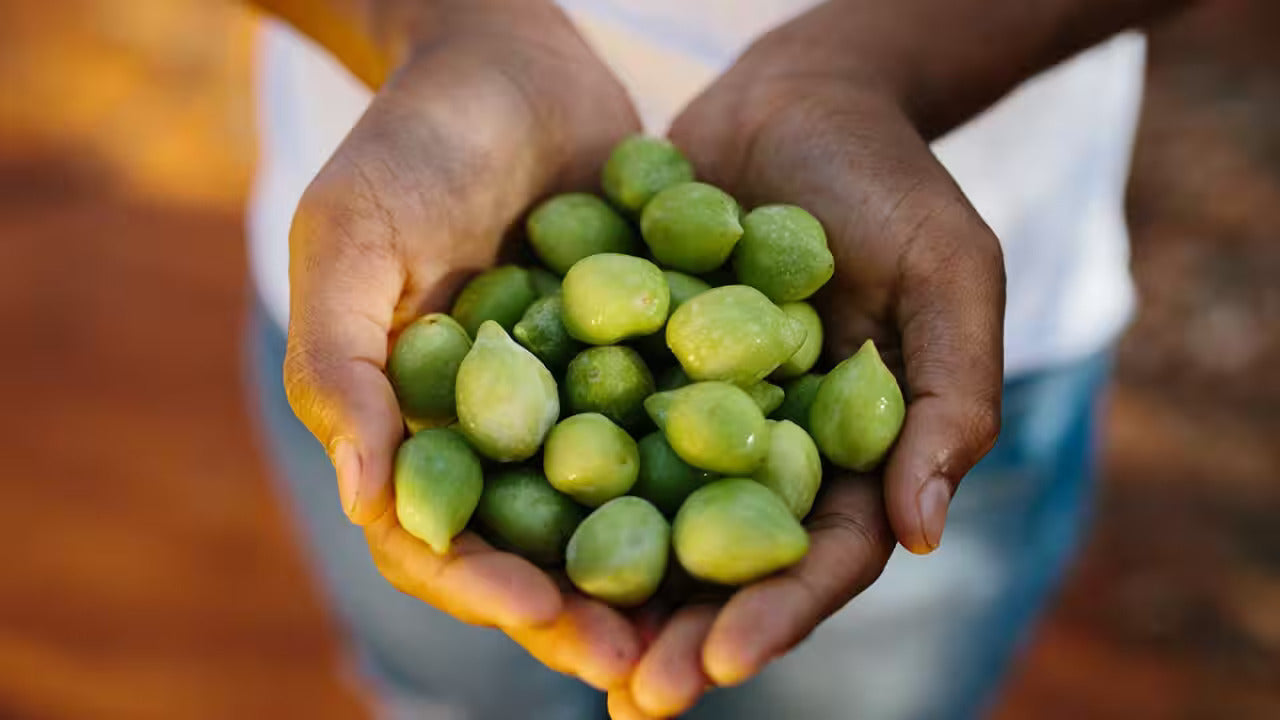![]()

How Beekeeping Supports Communities and the Environment
Bees are more than just honey-makers. These tiny pollinators play a massive role in the health of our ecosystems, agriculture, and economies. Beekeeping is the practice of maintaining bee colonies, typically in man-made hives, has long been a sustainable way to coexist with these vital insects. But beyond the sweet golden honey and beeswax, beekeeping is a powerful tool that supports environmental conservation, empowers communities, and creates sustainable livelihoods.
In this blog, we’ll dive deep into why beekeeping matters and how it contributes to both people and the planet. We’ll explore the environmental, economic, and social benefits of beekeeping, and in the final section, we’ll share how Honey Biotics with their Save the Bees Program contributes to this effort through partnership with Heifer International.
The Environmental Role of Bees
Pollinators at the Heart of Ecosystems
Bees are among the most effective pollinators on Earth. As they move from flower to flower collecting nectar and pollen, they help fertilize plants, which enables fruits, vegetables, seeds, and nuts to grow. This process, known as pollination, is critical not only for food production but also for maintaining biodiversity.
What Happens Without Bees?
The absence of bees would have dire consequences. According to the Food and Agriculture Organization (FAO), about 75% of the world’s food crops depend at least in part on pollination. Without bees, crop yields would dramatically decline, affecting food availability and prices globally. Additionally, many wild plants rely on bee pollination to reproduce, so the disappearance of bees could disrupt entire ecosystems.
Threats Facing Bee Populations
Unfortunately, bee populations around the world are declining due to factors like:
-
Pesticide use (especially neonicotinoids)
-
Habitat loss
-
Climate change
-
Diseases and parasites (like the Varroa mite)
This decline underscores the urgency of supporting beekeeping as a method of both preserving bee populations and educating communities about their importance.
The Economic Impact of Beekeping
A Low-Cost, High-Impact Livelihood
Beekeeping is often referred to as a “backyard business”. It requires relatively low startup costs compared to other forms of agriculture, making it accessible to rural and underserved communities. With proper training and initial supplies, families can quickly begin harvesting honey, wax, and other bee products that have tangible market value.
Multiple Revenue Streams
Beyond honey, bees provide:
-
Beeswax: Used in candles, cosmetics, and natural skincare products.
-
Propolis: A resin-like material used in health supplements and herbal remedies.
-
A sought-after substance often used in beauty and wellness products.
-
Pollination services: In some areas, beekeepers can earn income by offering pollination for nearby farms and orchards.
This diversity of products makes beekeeping a resilient and multi-functional livelihood.
Supporting Local Economies
When families start beekeeping, they often sell their products at local markets, which stimulates economic activity in rural areas. Local businesses that support beekeeping (e.g., suppliers of jars, labels, equipment, and packaging) also benefit. In this way, beekeeping contributes to both household income and broader economic development.
The Social Benefits of Beekeeping
Building Community Resilience
When communities are trained in beekeeping, they gain more than just financial benefits. They develop:
-
Food security
-
Economic opportunity
-
Education and community involvement
Beekeeping cooperatives or associations often form around shared learning and collective marketing efforts, which fosters collaboration and community resilience.
Educational Opportunities
Beekeeping also presents opportunities for education, especially in agricultural and environmental sciences. Schools and non-profit organizations often use apiaries (bee yards) as outdoor classrooms to teach students about ecology, sustainability, and biology.
Beekeeping and Biodiversity
Encouraging Native Plant Growth
By supporting pollination, bees contribute to the growth of native plants and wildflowers. This not only maintains biodiversity but also helps prevent soil erosion, supports wildlife habitats, and contributes to cleaner air and water.
Regenerative Agriculture
Beekeeping naturally aligns with the principles of regenerative agriculture, which seeks to improve the health of ecosystems rather than deplete them. Bees help maintain healthy crops and pastures, making beekeeping a complementary practice to other sustainable farming methods.
Challenges and Solutions in Beekeeping
Barriers to Entry
While beekeeping is low-cost compared to other agricultural endeavors, it still requires:
-
Access to training and mentorship
-
Quality beekeeping equipment
-
Knowledge of local ecosystems
These barriers can be especially challenging in impoverished or remote communities.
Solutions that work:
-
Community-based training programs
-
Starter kits with beehives, suits, and tools
-
Long-term mentorship and cooperative development
These interventions help ensure that beekeeping becomes a sustainable and self-sufficient enterprise.
Our Commitment: The Honey Biotics x Heifer International Partnership
At Honey Biotics, we believe that true beauty comes from nature, and that includes protecting it. That’s why we’ve partnered with Heifer International and launched the Save the Bees Program.
With every purchase of a Honey Biotics product, a portion is donated to support beekeeping initiatives in communities that need them most. These funds go directly toward:
-
Training families in sustainable beekeeping practices
-
Providing beekeeping equipment and starter hives
-
Supporting environmental education and biodiversity
Why It Matters
Your skincare purchase doesn’t just help your skin barrier; it helps support real-life bee guardians, farmers, and changemakers around the world. These are people who are actively making their communities more resilient, their ecosystems more vibrant, and their futures more secure. By choosing Honey Biotics, you’re supporting a cycle of wellness for your skin, for people, and for the planet.
For more information click here.
Final Thoughts
Beekeeping is far more than a hobby or a means to produce honey. It’s a pathway to sustainability, empowerment, and environmental regeneration. It connects people with nature and fosters stewardship of the land. And when supported properly, it can lift families out of poverty while helping save one of the world’s most essential species.
At Honey Biotics, we’re honored to play a small role in this larger movement. Through our partnership with Heifer International, your skincare routine becomes part of something truly meaningful.
Together, let’s nourish skin, empower communities, and protect the bees.




